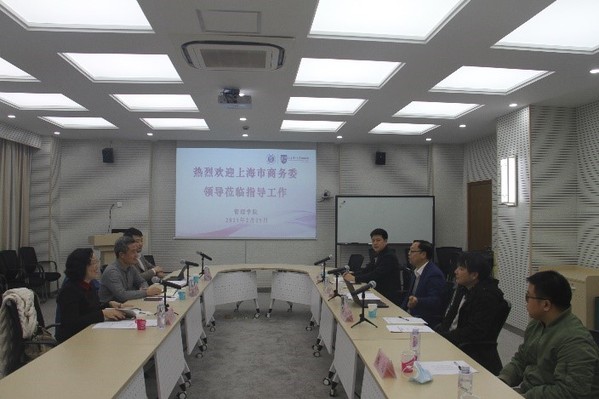Business school Professor Zhao Laijun’s policy advice special report submitted before the Spring Festival regarding Shanghai's need to accelerate the development of China Railway Express recently received instruction from city leaders to require relevant government departments to investigate and implement. On the afternoon of February 25, Li Wei, deputy director of the Port Management Office of the Shanghai Municipal Commission of Commerce, and Liu Diling, an investigator from the Foreign Trade Development Office, visited the Business School for investigation and exchanges. Professor Zhao Laijun, Associate Professor Cheng Zhaolin, PhD student Xing Yuan, and Vice Minister Zhang Yunwei of the Shanghai Institute of Development Strategies and other special report authors attended the meeting.
On behalf of the Business School, Professor Zhao Laijun first extended a warm welcome to the leaders of the Commission of Commerce and thanked the Shanghai Municipal Commission of Commerce for its continuous support to the work of the college. Later, Professor Zhao Laijun gave a special report on the research results, talent training and social services of the research team in the China Railway Express over these years, and had a heated discussion and in-depth exchanges with everyone on the Shanghai’s accelerating the development of the China Railway Express.
Deputy Director Li Wei pointed out that Shanghai is playing a role as a bridgehead in serving the construction of country’s “the Belt and Road”, and should take the lead in forming a “dual circulation” development pattern. Shanghai, as the national shipping center, should develop China Railway Express trains from a strategic perspective and proposes a feasible implementation plan. Shanghai has always been adhering to international practices and solving problems through the market. The China Railway Express project should not only rely on government subsidies but use big data analysis and consider issues from multiple perspectives to promote its smooth implementation in Shanghai.
Professor Zhao Laijun gave three answers to the questions raised by Deputy Director Li Wei: First, all provinces and cities across the country are making great efforts developing China Railway Express and there is fierce competition, while the development of Shanghai is relatively lagging. However, according to the data of the research team, Shanghai ranks 12th in the ranking of railway freight network connectivity. Some regions with good development of China Railway Express have network connectivity worse than Shanghai. Therefore, it is feasible for Shanghai to develop China Railway Express. From an industrial perspective, the value of government subsidies lies in cultivating and supporting the development of related industries. They can generate a series of driving effects and spillover effects through the opening of the China Railway Express. Shanghai should adhere to both roads and belts. Thirdly, Shanghai accelerates development of the China Railway Express contributes to Shanghai's response to the dual circulation development strategy, in favor of stabilizing Shanghai's imports and exports under the influence of the epidemic, and is beneficial for Shanghai to further exert the radiation spillover effect of the CIIE. Professor Zhao Laijun also provided measures and suggestions for accelerating the development of China Railway Express from the aspects of normal operation of China Railway Express, establishment of train assembly centers, exploration of sea-rail combined transport modes, and promotion of policies.
Finally, Deputy Director Li Wei fully affirmed the research work carried out by Professor Zhao Laijun’s team on the China Railway Express. At the same time, he expressed his own views on how the team will promote the implementation of the China Railway Express project in Shanghai. He hoped the team members will continue to make efforts to advise the government and make better use of the role of think tanks.
After nearly two hours of in-depth communication and exchanges, the investigation and exchange meeting ended successfully.



